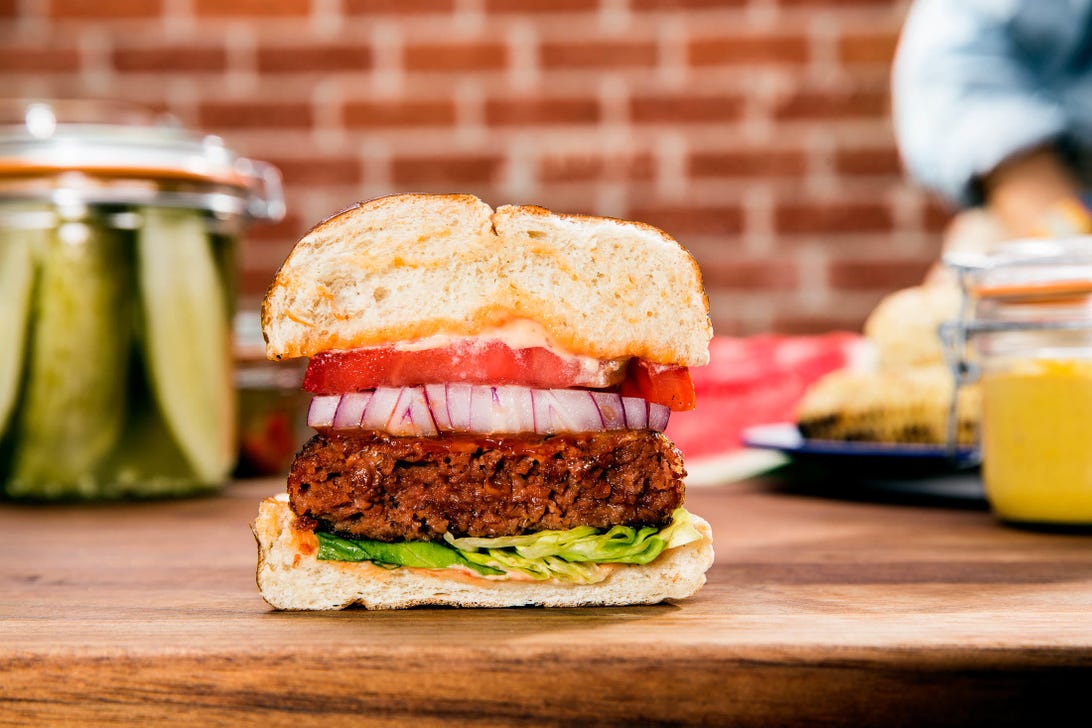Are Beyond Meat Burgers Healthier Than Beef
Lab-grown foods like the Impossible Burger represent the ultimate conflict in health information: We're told that plant-based diets are healthy, but we're also told that processed foods are unhealthy. The Impossible Burger, the Beyond Burger and other faux meat products are plant-based but highly processed.
So what's the better option? Plant-based or less processed foods?
To be clear: Just because something is plant-based or vegan, that doesn't mean it's automatically healthy. White bread is vegan, as are tater tots. Cookies, cakes and even grilled cheeses can be entirely plant-based. And your doctor probably isn't telling you to eat more of those items, even if they are made of plants.
Read more: 10 Essential Kitchen Tools for a Vegan Kitchen in 2022
This isn't to bash vegetables -- they're still important and should be included in your meals. But as faux meat burgers skyrocket to unprecedented levels of popularity, it's worth taking a closer look at what's actually inside plant-based meat products and comparing the health implications.
To be fair, Impossible Foods and Beyond Meat do not explicitly market their products as being healthier than beef, but rather as a sustainable and environmentally friendly alternative.
In this article, I cover how the common meat alternative (faux beef) nutritionally compares to its real counterpart.

The Impossible Burger has grown in popularity for plant-based foods.
Anthony Lindsey Photography/Impossible FoodsReal beef vs. plant-based beef
Gone are the days of crumbly black bean and tofu patties. Vegans and vegetarians -- and meat eaters -- can enjoy extremely beef-like burgers that contain no beef at all. The Impossible Burger and the Beyond Burger definitely top the fake beef popularity charts, but Kellogg, Kroger, Meatless Farm Co and other brands have followed suit with similar meatless patties.
The question is not whether these products do a good job at mimicking beef -- they do. The question, rather, is whether fake beef stacks up to real beef in terms of health and nutrition. Let's compare.
100 grams (3.5 ounces) of lean ground beef (10% fat) contains:
- 217 calories
- 12 g fat (5 g saturated)
- 90 mg cholesterol
- 70 mg sodium
- 0 g carbohydrate
- 0 g fiber
- 26 g protein
Keep in mind that the caloric and fat values of ground beef increase as the fat percentage increases.
The 4-ounce Impossible Burger 2.0 comes pretty close to beef, nutritionally:
- 240 calories
- 14 g fat (8 g saturated)
- 0 g cholesterol
- 370 mg sodium
- 9 g carbohydrate
- 3 g fiber
- 19 g protein

A cross section of a Beyond Meat Burger.
Beyond MeatThe Impossible Burger also boasts a pretty impressive micronutrient profile, but keep in mind these nutrients don't all occur naturally: Impossible Foods fortifies its burgers to boost the nutrient content.
While the macronutrient profiles of real beef and Impossible ground beef are comparable, their levels of processing are not. Because it doesn't occur in nature, plant-based beef is highly processed, comprised of a variety of plant ingredients, colorings, extracts and preservatives to mimic the taste, texture and aroma of real beef.
For example, the Impossible Burger contains soy protein, aningredient called soy leghemoglobin (which makes the burger "bleed"), sunflower and coconut oils, methylcellulose, yeast extract, cultured dextrose, food starch and more. So if your goal is to eat less processed foods, real beef is the way to go (not including items like hot dogs, which are also very processed).
One particular concern about faux beef is the sodium content, as pointed out by Dr. Andrew Weil, an integrative medicine doctor and creator of the praised Anti-Inflammatory Diet. One version of the Impossible Burger -- the Impossible Whopper at Burger King -- contains 1,343 milligrams of sodium, which is even more than what's in a regular Whopper.
Read more: The Ultimate Beyond Burger vs. Impossible Burger Taste Test
Plant-based meat and real meat each have their own pros and cons. You should choose which to eat based on your dietary preferences and values.
CNETThe consensus on real meat vs. fake meat
There's no real scientific consensus on this topic yet, as vegan meat is too new for health officials to make a conclusion -- that's something scientists can do only after plenty of peer-reviewed, third-party (meaning not conducted by a vegan meat company) research has accumulated.
And even then, things can change: The last couple generations of Americans have spent their lives fearing red meat, only to find out that saturated fat really isn't as bad as we thought.
Also, the decision to eat vegan meat in place of real meat is more than a question of nutrition. Many people decide to eat a vegan diet out of moral and ethical values, such as animal welfare or environmental health.
Eating a plant-based meat substitute a few times a week probably won't hurt you, just like eating beef a few times a week won't hurt you. Fake meat is best treated like real meat: Use it as a protein source, not as a substitute for vegetables.
The information contained in this article is for educational and informational purposes only and is not intended as health or medical advice. Always consult a physician or other qualified health provider regarding any questions you may have about a medical condition or health objectives.
roneymiteraid1983.blogspot.com
Source: https://www.cnet.com/health/nutrition/is-the-impossible-burger-healthier-than-beef/
0 Response to "Are Beyond Meat Burgers Healthier Than Beef"
Mag-post ng isang Komento